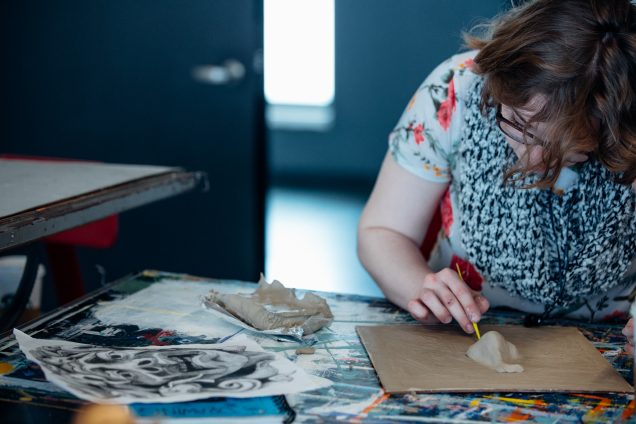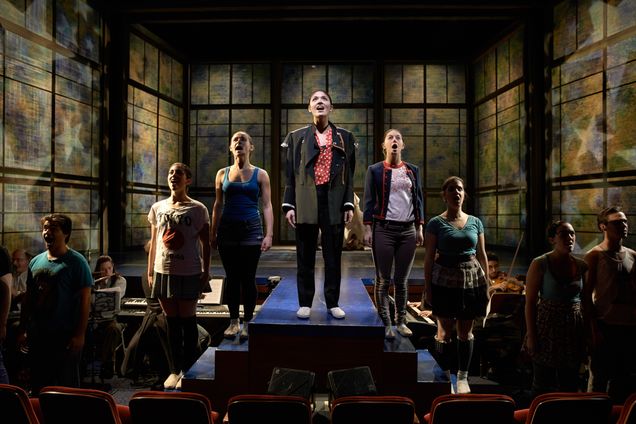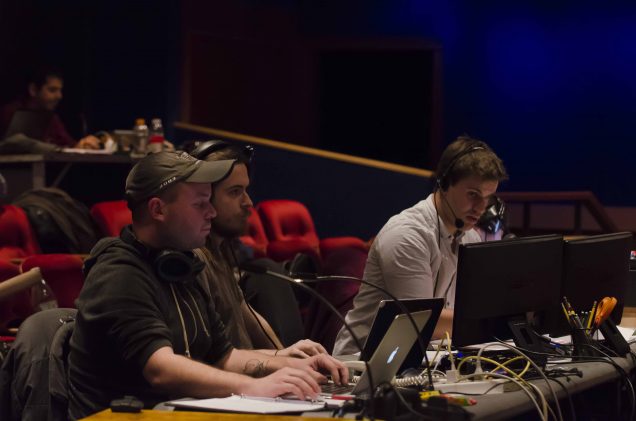At BU, each student’s program of study is devised to reflect and enrich their own particular talents and interests as they develop their own unique voice as a theatre artist. As a BFA stage management student, extensive mentored production work combines with classroom study so that theoretical knowledge is put to the test and real-life situations are discussed outside the time pressures of rehearsals. Students within this program share a common experience of both specific focus and broad responsibility that leads to an unusually strong sense of community with designers, directors, and actors.

What’s unique about our program?
The BFA stage management program at BU aims to develop a complete theatre artist by fostering a passion for theatre, storytelling, management, and collaborative process. Students learn about the art and craft of stage management while also learning how to be a full person who makes theatre.
The diversity within the curriculum provides opportunities for students to gain experience in all areas of theatre-making that aid students in developing as well-rounded stage managers.
Program of Study
Before officially declaring a BFA-Theatre, Design, Production & Management major, each first-year student entering the BU School of Theatre is admitted into the First Year Design, Production & Management Core. The First Year Core experience establishes a base vocabulary that serves as the foundation for a student’s progression into their chosen BFA degree program. In addition, the First Year Core is designed to provide an appropriate context for faculty evaluation of each student’s strengths, interests, and potential for success in the upper years of training. At the end of the first year, each student will declare a BFA major; these decisions are reviewed and mentored by members of the School of Theatre faculty before a student is officially enrolled in their BFA program.
Stage Management majors will hone their personal philosophy of theatre artistry and management and explore their own innovative and collaborative creative process through mentored production assignments and hands-on study. An individualized program of study balances management, design, production, and performance courses while also allowing for an interdisciplinary experience through the wide selection of courses available at BU.
Students engage with current theatre/performing arts practices of design, production, and management through associations with professional theatre organizations, the general arts community in Boston, School of Theatre alums, and a faculty of active theatre professionals.
Typically three to five First Year Design, Production, & Management students declare Stage Management as their major per year and on average, stage management courses enroll eight to 10 students.
Situated within a large, top-tier research institution, students pursue coursework in the University Hub, the University’s general education program that is integrated into the undergraduate student experience. This provides students with the chance to dive into other topics, from other colleges and schools, to enhance their studies.
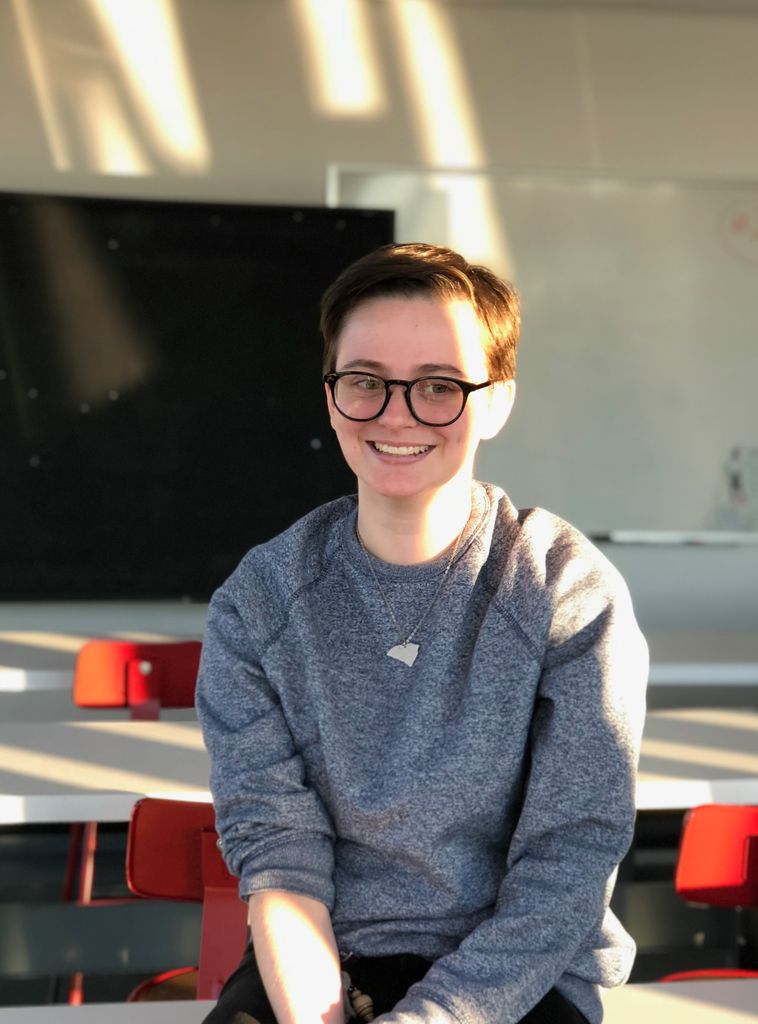
STUDENT FEATURE
Meet Jolie Frazer-Madge (CFA’20), a stage management and political science alum. Originally from Lexington, South Carolina, Jolie was committed to pursuing her college studies at BU after a visit during Accepted Students Day.
“I was really captivated by the students’ and faculty members’ commitment to fostering a community of theatre artists interested in speaking truth to power and pushing the boundaries of what theater can and should be,” shares Jolie. “I was also really drawn in by the faculty’s sense of responsibility and genuine interest shown towards its students—the head of my program came and talked to me and my parents for over an hour in the dining hall, which already made me feel like I was a part of the community.”
During her time at CFA, Jolie was the assistant stage manager for a play at Boston Playwrights’ Theatre called Winter People. As ASM, she was in charge of tracking props, costumes, and basically anything that happens backstage. “It was really cool to watch this script come to life stage-by-stage, first with the actors, and then with the technical elements (lights, sound, set, costumes, etc.), and also how it has changed as we’ve been working through it,” says Jolie.
Having worked on Winter People gave Jolie the opportunity to qualify for the Actors’ Equity Membership Candidate Program, which allowed her to start earning points for her Actors’ Equity Association Membership.
Opportunities
First-year students explore all areas of design, production, & management, which can include working as a production assistant. Upperclassmen are assigned as a stage manager or assistant stage manager on at least one show every semester. Students work closely with their faculty mentor to identify their goals and areas for growth in preparation for their assigned role on each project.
The School of Theatre works in a variety of spaces and produces many types of shows of varying scales promoting flexibility and a well-rounded skill set through hands-on experience as a stage manager and assistant stage manager.
BU Opera Institute produces two chamber operas and two large-venue operas every year in collaboration with School of Theatre, providing students with exposure to the specificity of opera stage management.
A faculty and staff of working theatre professionals mentor stage management students in their studio and production coursework. There is also a strong tradition of peer mentorship among the students within the School of Theatre management community.
Develop professional skills through production work, internships, and mentored work that will serve as a basis for your transition from the academic world to the larger community of theatre professionals. The School of Theatre works in a variety of spaces and produces many types of shows promoting flexibility and a well-rounded skill set. Participate in SOT’s annual Theatre Showcase that takes place in Boston or New York City. The event serves as a celebration of the graduating class and the group’s formal introduction to the professional theatre community.
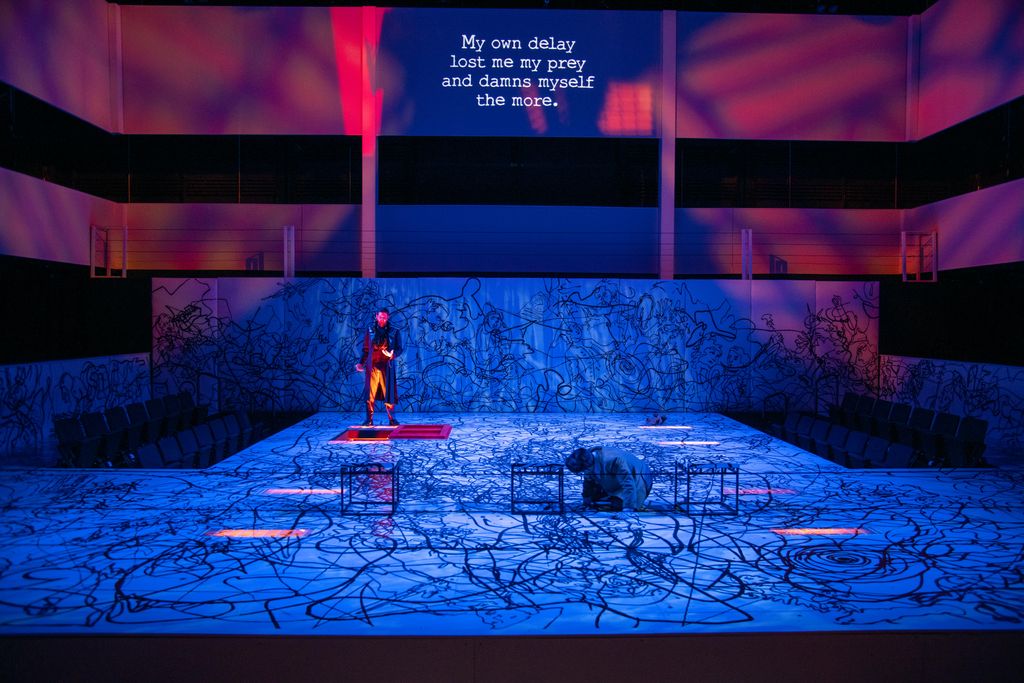

Faculty
Each student’s program of study is devised to reflect and enrich their own particular talents and interests as they develop their own unique voice as a theatre artist. Students within this program share a common experience of both specific focus and broad responsibility that leads to an unusually strong sense of community with designers, directors, and actors.
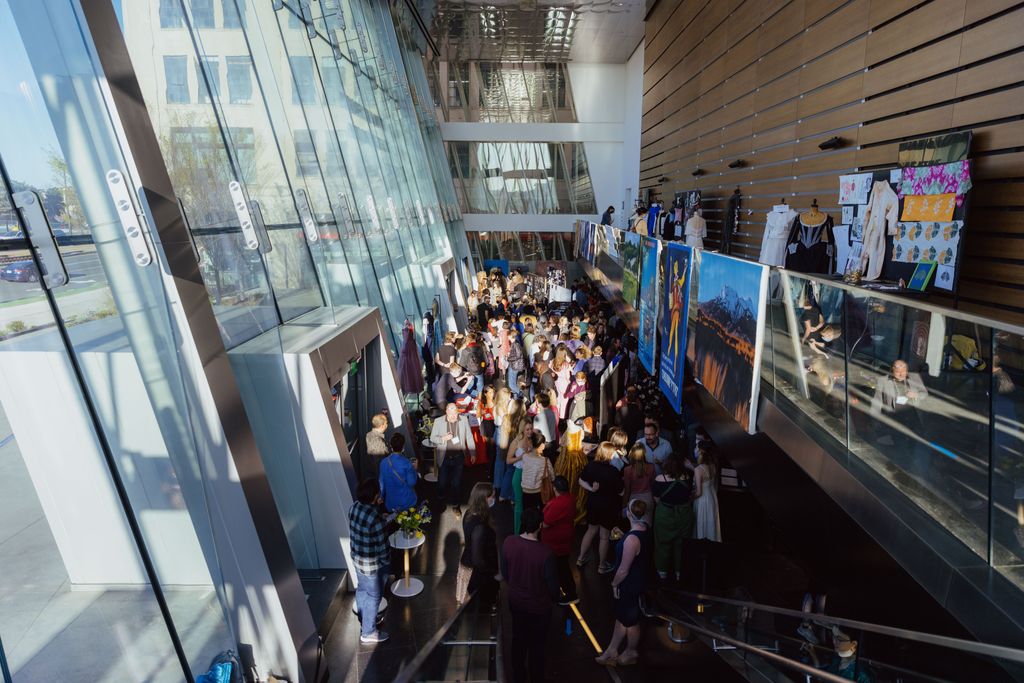
Faculty Professional Affiliations
Renee E. Yancey
- Member, Actors’ Equity Association
- Member, Production Manager’s Forum
- Regional Representative – Greater Boston Area, Stage Managers’ Association
The resources and opportunities that the School of Theatre provides to its students are unparalleled. I knew my experience at the SOT would be deeply challenging, but also incredibly rewarding and valuable. This is also the most rewarding – successfully being able to work with six different directors and casts to create amazing work is a thrilling collaborative experience.
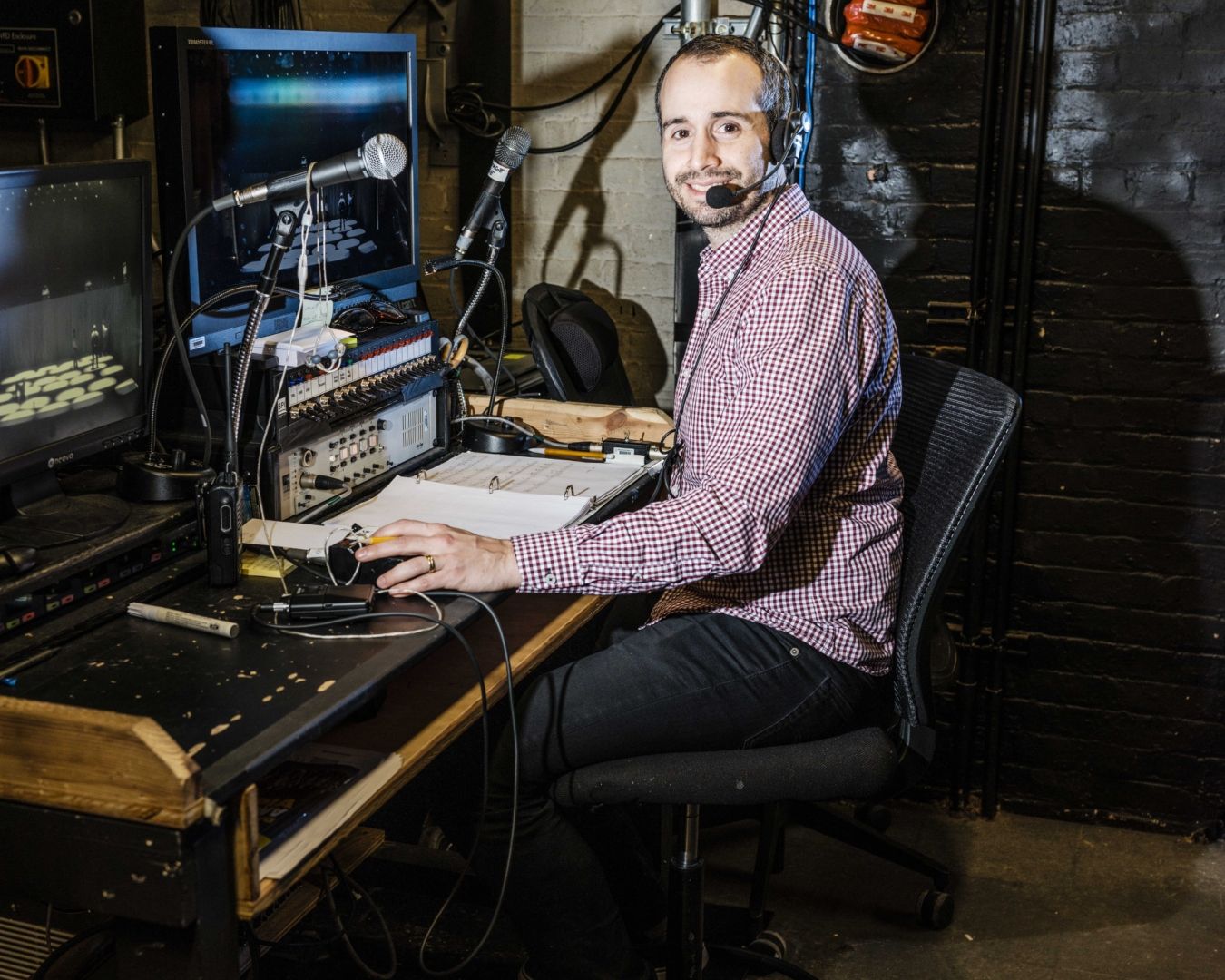
From CFA to Broadway
Meet Greg Livoti (CFA’05), production stage manager for Phantom of the Opera, the longest-running Broadway show in history.
When Livoti first came to BU to study stage management, he was surprised to find a list of art supplies rather than books on his first course syllabus. “It was a shock when I learned I was going to be hand drafting and sewing. I’m not an artistic or design-oriented person,” he says. “But the more I worked, the more I could see how I drew upon those basic foundations.”
As a stage manager, Livoti compares his work to air traffic control. Once the curtain rises, Livoti is either calling out lighting cues or taking notes on the performance that he’ll share with creative and technical staff the following day—which could range from a performer standing slightly off his mark or a costume that needs repair. Livoti also maintains calendars for the production, scheduling rehearsal time, working new cast members into the show, and making sure that the team is always ready for the next performance.
“It’s our job to make sure that the artistic intentions of the creative team in performance number one are still playing true in performance 248 or 2,448 or 10,448,” Livoti says. “It takes over 100 human beings to do Phantom of the Opera every night, and I have weekly conversations involving every department. It’s very much a collaborative effort.”
Notable Graduates
Graduates of BU’s stage management program go on to become stage managers and assistant stage managers in theatre, opera, dance, and events. Another popular career option is production managers and production coordinators in the performing arts.
- Brian August (CFA’10) | Stage Manager, Houston Grand Opera; Production Stage Manager, Des Moines Metro Opera; AGMA National Vice President
- Carrie Boyd (CFA’09) | Executive Producer, Emursive Productions/Sleep No More, New York City
- Skylar Burks (CFA’15) | Founder/Executive Director, Atlanta Theatre Artists for Justice; Stage Operations, Alliance Theatre, Atlanta, GA
- Jackie Fulton (CFA’15) | Assistant Stage Manager, Royal Ballet at Royal Opera House, London, UK
- Kendra Green (CFA’18) | Resident Stage Manager, Opera Colorado, Denver, CO
- Stephen M. Kaus (CFA’02) | Director of Artistic Producing, Manhattan Theatre Club, NYC
- Kelly Levy (CFA’06) | Freelance Stage Manager, New York City
- Gregory T. Livoti (CFA’05) | Production Stage Manager, Phantom of the Opera, Broadway
- Madison Lusby (CFA ‘19) | Freelance Events Producer, Coordinator, & Stage Manager, New York
- Corinne Marrinan (CFA’95) | Producer and Writer, Film & Television; Academy Award Winner for Best Documentary Short Subject
- Marti McIntosh (CFA’03) | Operations Manager, Northeastern University Department of Theatre, Boston, MA
- Grayson Meritt (CFA’96) | Freelance Stage Manager and Show Caller, Los Angeles, CA
- Brian M. Robillard (CFA’16) | Freelance AEA Stage Manager, Boston, MA
- Kevin Schlagle (CFA’12) | Freelance AEA Stage Manager, Boston, MA
- Leslie Sears (CFA’08) | Freelance AEA and AGMA Stage Manager
- Libby Unsworth (CFA’06) | Freelance Stage Manager, New York City
- Annie Zaruba-Walker (CFA’18) | Associate Producer, Pie Town Productions, North Hollywood, CA
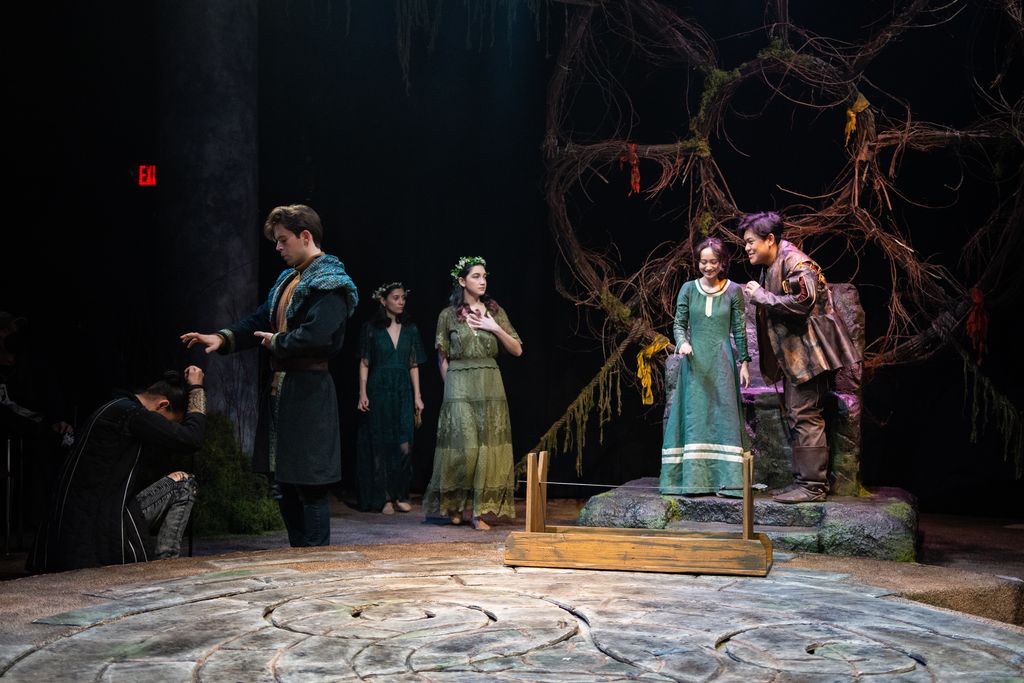
Next Steps for Applicants
The best way to determine if BU is right for you is to explore our admission requirements, financial tools, and resources.
Fill out our request for info about BU theatre programs form to receive additional information about your program of interest and to send us any questions you may have.
REQUEST INFO ABOUT THE BFA THEATRE ARTS, DESIGN & PRODUCTION (STAGE MANAGEMENT) PROGRAM
We are happy to discuss your educational interests and career goals.












